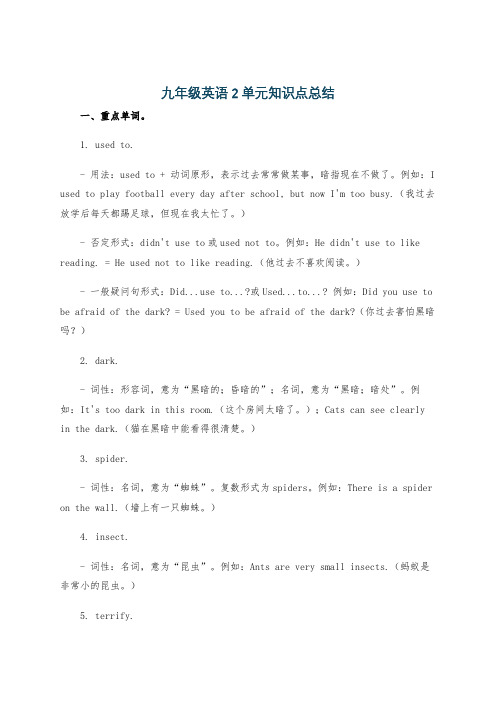中考英语总复习重点句式二(基础讲解
- 格式:docx
- 大小:26.57 KB
- 文档页数:13

Unit 2 I think that mooncakes are delicious!重点知识总结重点词汇:1.race n.竞赛,比赛●Lisa won the race. Lisa赢了比赛.●Shall we have a race?我们来比赛跑,好吗?●It’s a race between the two best runners of the club.这是俱乐部中两名最佳选手的的赛跑。
●My brother enjoys watching basketball matches.我哥哥喜欢看篮球比赛。
●They’re in training for the big game.他们正在为大赛进行训练。
●Alex won the first prize in a maths petition last weekend.Alex上周末获得了数学竞赛一等奖。
2.wonder v. 想知道,想弄明白(相当于want to know)●I wondered where you were.我想知道你在哪里。
●Scientists also wonders if there is any creature in outer space.科学家也想知道外太空是否有生物。
〖拓展〗wonder可作名词,意为“奇迹,奇观”●The Tower of Pisa is one of the New Seven Wonders of the world.比萨斜塔是世界七大奇迹之一。
3.traditional adj.传统的,惯例的●She wears a traditional dress.她穿着一件传统服装。
●It's traditional in America to eat turkey on Thanksgiving Day.感恩节时吃火鸡是美国的传统。
【拓展】traditional的名词形式是tradition,意为“传统,惯例”●There is a tradition in our family that we have a party on NewYear’s Eve.我们家有个传统,全家要聚在一起过新年除夕。

人教版九年级英语全一册:Unit 2语法知识点复习提纲重点短语、重点句型知识点、交际用语、语法、单元同步书面表范文达大全Unit 2 I think that mooncakes are delicious!一、重点短语Section A 1a-1c1.泼水节Water Festival2.Dragon Boat Festival端午节3.春节Chinese Spring Festival4.元宵节Lantern Festival5.吃粽子have zongzi6.下年next year7.回来be back8.看龙舟比赛watch the races9.最喜欢like bestSection A 2a-2d10.香港Hong Kong11.出去吃eat out12.一天吃五顿饭eat five meals a day13.穿上,发胖put on14.两周后in two weeks15.从......到......from...to...16.从4月13日到15日from April 13th to 15th17.和......类似/相像be similar to18.傣族the Dai People19.在云南省in Yunnan Province20.我认为是这样。
I think so.21.是......的时候/时间the time of22.泰国新年Thai New Year23.走到大街上,到大街上go on the streets24.相互泼水throw water at each other25.each other/one another彼此,互相26.是用来......的时间be a time for27.冲走,洗掉,冲洗wash away28.拥有好运have good luck29.在新的一年里in the new yearSection A 3a-3c30.庆祝中秋节celebrate the Mid-autumn Festival31.中秋节Mid-autumn Day/Festival32.吃月饼enjoy mooncakes33.呈......的形状be in shape of34.一轮满月a full moon35.寄托着对......的祝愿/祝福carry people’s wishes to36.传统的民间故事traditional folk stories37.射下shoot down38.仙药,仙丹,魔药magic medicine39.永生,长生不老live forever40.飞到/向月球fly up to the moon41.如此......以至于......so ...that...42.对着......呼喊/喊叫某人的名字call out sb’s name to43.摆开,布置lay out44.在花园in the garden45.回来come back46.此后,之后after this47.......的传统the tradition of48.赏月admire the moon49.和某人品/吃月饼share mooncakes with sb.50.在地球上on the earth51.在夜里at night52.结果as a resultSection A Grammar Focus-4c53.举行龙舟,比赛have the races54.dragon boat team龙舟队55.......的好时候/间be a good time56.龙舟,龙船dragon boats57.回家come home58.母亲节Mother’s Day59.在五月的第二个星期天on the second Sunday of May60.父亲节Father’s Day61.在六月的第三个星期天on third Sunday of June62.给每人送礼物give gifts to sb.63.普通的礼物common gifts/presents64.庆祝母亲节celebrate Mother’s Day65.庆祝父亲节celebrate Father’s Day66.在中国in China67.在那边over there68.送给某人类似的礼物give similar gifts to sb.69.必须,不得不have to70.花大量的钱spend a lot of money71.好主意great/good ideaSection B 1a-1d72.乔装,打扮dress up73.鬼屋haunted house74.黑猫black cat75.不请吃就捣蛋trick or treat76.庆祝万圣节,过万圣节celebrate Halloween77.认为,考虑,思考,想到think of78.关闭turn off79.关灯turn off the lights80.把......放在门边put...around the door81.装扮成dress up as82.卡通人物/角色cartoon characters83.附近的街区around the neighborhood84.要求,询问,要ask for85.捉弄某人play a trick on/upon86.招待某人give sb. a treat87.了解learn aboutSection B 2a-2e88.《圣诞赞歌》A Christmas Carol89.圣诞节的精神/真谛the spirit of Christmas90.圣诞树Christmas trees91.圣诞老人Santa Claus92.在于/存在于......的真谛lie the true meaning of93.......的重要性the importance of94.......的最好范例/典范/榜样/例子the best example of95.短篇小说short novel96.考虑自己,自私think about oneself97.关心,在乎care about98.圣诞节前夕Christmas Eve99.......的鬼魂/魂魄the ghost of......100.合伙人,生意伙伴business partner101.最终成为end up102.改变某人的生活方式change one’s way103.圣诞节过去之灵/精灵/魂the Ghost of Christmas Past 104.把某人带回到take sb. back to105.让某人想起remind sb. Of106.圣诞节现在之魂/精灵/灵the Ghost of Christmas Present 107.带某人去......take sb. to ...108.最后一个the last one109.圣诞节未来(将来)之灵/精灵/魂the Ghost of Christmas Yet 110.睡醒,唤醒wake up111.找出,找到,查明find out112.第二天早上the next morning113.圣诞节Christmas Day114.圣诞节快乐Merry Christmas115.在危难中,在危急中,急需,需要in need116.改变某人的生活chang e one’s life117.......的精神/真谛the true spirit of118.圣诞节的真谛/的真正精神the true spirit of Christmas Day119.有很多的朋友have a lot of friendsSection B 3a-Self Check120.西方国家Western countries121.庆祝复活节celebrate Easter122.在......之间between ...and...123.新生命的诞生/开始the beginning of new life124.下蛋lay out125.孕育生命give birth to life126.新生命的象征be a symbol of new life127.不但......而且.....not only...but also...128.分发,散发give out=hand out129.到处分散,到处传播spread ...around130.create good business for为......带来/创造良好的生意二、重点句型知识点Section A标题句型1.I think that mooncakes are delicious!我认为月饼很美味。

九年级英语2单元知识点总结一、重点单词。
1. used to.- 用法:used to + 动词原形,表示过去常常做某事,暗指现在不做了。
例如:I used to play football every day after school, but now I'm too busy.(我过去放学后每天都踢足球,但现在我太忙了。
)- 否定形式:didn't use to或used not to。
例如:He didn't use to like reading. = He used not to like reading.(他过去不喜欢阅读。
)- 一般疑问句形式:e to...?或Used...to...? 例如:Did you use to be afraid of the dark? = Used you to be afraid of the dark?(你过去害怕黑暗吗?)2. dark.- 词性:形容词,意为“黑暗的;昏暗的”;名词,意为“黑暗;暗处”。
例如:It's too dark in this room.(这个房间太暗了。
);Cats can see clearlyin the dark.(猫在黑暗中能看得很清楚。
)3. spider.- 词性:名词,意为“蜘蛛”。
复数形式为spiders。
例如:There is a spider on the wall.(墙上有一只蜘蛛。
)4. insect.- 词性:名词,意为“昆虫”。
例如:Ants are very small insects.(蚂蚁是非常小的昆虫。
)5. terrify.- 词性:动词,意为“使害怕;使恐惧”。
常见搭配:terrify sb.例如:The loud noise terrified the baby.(巨大的噪音吓坏了婴儿。
)- 形容词形式:terrified(感到害怕的,用来形容人)和terrifying(令人害怕的,用来形容事物)。

2023年中考英语总复习英语精华知识点全汇总建议收藏英语语法重点与难点> as…as…结构:You' re a boy as good as Tom.二You' re as good a boy asTom.你和汤姆是一样好的孩子。
1、(1) too…to与so…that sb. can' t…的句型转换:前者为简单句,主语只有一个,而后者为复合句,主语有两个:The man was too angry to be able to speak.The man was so angry that he wasn' t able to speak.(2)too…to…与not enough to句型的转换:He is too young to get married. =He is not old enough to get married.The book is too difficult for me to read.=The book isnot easy enough for me to read.2、形容词原级表示比拟级含义: 的知觉中。
如:Did it occur to you to phone them about it?你难道没想到就这事给他们打个?事件作主语时,happen和occur可以通用?如:The accident happened/occurred yesterday. 事故是昨天发生的。
take place指事件发生,但常用来表示“举行”的意思,带有非偶然性?如:The meeting took place last night.会议昨晚举行。
14.in front of, in the front of in front of的意思是“在前面”。
如:There is a tree in front of the house.房子前面有一棵树。


Unit2 I think that mooncakes are delicious一、语法要点:(一)宾语从句:宾语从句就是由一个句子来构成主句的宾语We know (that)he likes English.主语谓语宾语1、宾语从句三要素:连接词、语序、时态①连接词:1)that(即陈述句作宾语从句。
that在从句中不充当任何句子成分,只起连接主句和从句的作用。
that不用翻译出来,在口语中常省略。
)The girl said, “I can help him.”→The girl said (that) she could help him.2)if/whether(whether或if在句中不充当任何句子成分,只起连接作用,但不能省略。
翻译成“是否”。
主句 + if / whether + 由一般疑问句变成的陈述句形式。
)Li Lei wonders . Is Jim in ? → Li Lei wonders if Jim is in.3)who,whose,what,how,which,how many,how much等。
(原有的特殊疑问词+句子剩余部分的陈述句形式)He asks me, “What does your father do?”→He asks me what my father does.②时态:①当主句是一般现在时,从句用该用的时态(即从句的时态不受影响)②当主句是一般过去时态,从句必须用过去的某一时态。
I don't know when he will come back.我不知道他将何时回来。
He tells me that his sister came back yesterday.他告诉我他姐姐昨天回来了。
The children didn't know who he was.孩子们不知道他是谁。
He asked his father how it happened.他问他父亲这件事是如何发生的。
初中英语的重要句型:1. 主语+ 动词+ 宾语例如:I eat an apple every day.(我每天吃一个苹果。
)2. 主语+ 动词+ 间接宾语+ 直接宾语例如:He gave me a book.(他给了我一本书。
)3. 主语+ 动词+ 宾语+ 补足语例如:My dog makes me happy.(我的狗让我开心。
)4. 主语+ 系动词+ 表语例如:She is a teacher.(她是一位老师。
)5. 主语+ 动词+ 宾语+ 状语例如:They are studying hard.(他们正在努力学习。
)6. 并列句= 简单句+ 并列连词+ 简单句例如:I like English, and she likes math.(我喜欢英语,而她喜欢数学。
)7. 主语+ 动词+ 宾语(从句)例如:I think that he is a good student.(我认为他是一个好学生。
)8. 主语+ 动词+ 宾语+ 宾语补足语例如:They elected him president.(他们选举他为总统。
)9. 主语+ 动词+ 宾语+ 地点状语例如:I left my keys on the table.(我把钥匙落在桌子上了。
)10. 主语+ 动词+ 宾语+ 时间状语例如:We will meet tomorrow.(我们明天见面。
)11. 主语+ 动词+ 直接宾语+ to + 间接宾语例如:She gave a book to her friend.(她把一本书给了她的朋友。
)12. 主语+ 动词+ 宾语+ as + 形容词或副词+ as例如:He is as tall as his brother.(他和他的兄弟一样高。
)13. 主语+ 动词+ as + 形容词或副词+ as + 宾语例如:She is as busy as a bee.(她忙得不可开交。
)14. 主语+ 动词+ 宾语+ 动词不定式例如:I want to go to the park.(我想去公园。
xx要点句式二【真题再现】I.依据中文意思翻译句子。
(xx)1.多吃水果对我们的健康有利。
___________________________________________2.在周末我宁愿看书也不看电视。
___________________________________________3.这个火车站从 2008 年就投入使用了。
___________________________________________4.他特别聪慧,很快就算出了这道数学题。
____________________________________________5.无论你去哪儿,我都愿意与你同行。
____________________________________________II.依据中文意思完成英语句子,每空所填写的词数不限。
(滨州市中考)1.xx 帮助我。
Thank you for____________.2.晚餐后为何不出去漫步?____________ go out for a walk after supper?3.在 xx 每日有成千上万的旅客。
There are ____________in Beijing every day.4.令他惊诧的是,他妈妈的电话改变了他的生活。
__________________,his mother's phone call changed his life.5.学习英语的最好方法是运用英语。
_________________to learn English is to use English.【答案与分析】I.依据中文意思翻译句子。
1.It is good for our health to eat more fruit.2.I would rather read books than watch TV at weekends.3.This railway/train station has been in service/use since 2008.4.He is/was so clever that he works/worked out the maths problem quickly.5. Wherever you go/No matter where you go, I’ d like to go with you.II.依据中文意思完成英语句子,每空所填写的词数不限。
九年级英语unit2语法知识点九年级英语Unit 2 语法知识点介绍:九年级英语Unit 2是一个语法内容较为丰富的单元,主要涉及了被动语态、宾语从句以及特殊疑问句的构成和用法等知识点。
掌握这些语法知识对于理解和运用英语来说非常重要。
本文将以深入浅出的方式,论述这些语法知识点的用法和特点。
一、被动语态被动语态是英语中的一个重要语法现象,它可以使句子的表达更加灵活和准确。
被动语态的构成是由“be”动词加上过去分词形成,其基本结构为“被动语态的主语 + be动词 + 过去分词”。
被动语态的使用方式主要有以下几种情况:1. 当我们不知道或不关心动作的执行者时,可以使用被动语态。
例:The window was broken.(窗户被打破了。
)2. 当我们更注重动作的承受者时,也可以使用被动语态。
例:The letter was sent to me yesterday.(那封信在昨天被寄给我了。
)3. 当我们想避免提及动作的执行者时,被动语态也是一个很好的选择。
例:Mistakes were made.(犯了错误。
)需要注意的是,某些动词本身就是静态动词,无法转换成被动语态。
比如:have, belong, fit等。
此外,有些动词虽然可以表达被动的意思,但在实际使用中往往没有被动形式。
比如:arrive, go, come等。
二、宾语从句宾语从句是在一个句子中充当宾语的从句,它起到补充说明的作用。
在英语中,宾语从句的引导词有一定的限制,主要包括that, if, whether, wh-疑问词等。
宾语从句的引导词的选择与主句的动词以及上下文的意思有关。
例如:1. 当主句动词为think, know, believe, hope, say, suggest等时,通常使用that引导宾语从句。
例:I hope that you can come to my party.(我希望你能来参加我的派对。
)2. 当主句动词为ask, wonder, doubt, not sure等时,通常使用if或whether引导宾语从句。
xx重点句式二【真题再现】I.根据中文意思翻译句子。
(xx)1.多吃水果对我们的健康有益。
___________________________________________2.在周末我宁愿看书也不看电视。
___________________________________________3.这个火车站从2008年就投入使用了。
___________________________________________4.他非常聪明,很快就算出了这道数学题。
____________________________________________5.无论你去哪儿,我都愿意与你同行。
____________________________________________II.根据中文意思完成英语句子,每空所填写的词数不限。
(滨州市中考)1.xx帮助我。
Thank you for____________.2.晚饭后为什么不出去散步?____________ go out for a walk after supper?3.在xx每天有数以千计的游客。
There are ____________in Beijing every day.4.令他惊奇的是,他妈妈的电话改变了他的生活。
__________________,his mother's phone call changed his life.5.学习英语的最好方法是运用英语。
_________________to learn English is to use English.【答案与解析】I.根据中文意思翻译句子。
1. It is good for our health to eat more fruit.2. I would rather read books than watch TV at weekends.3. This railway/train station has been in service/use since 2008.4. He is/was so clever that he works/worked out the maths problem quickly.5. Wherever you go/No matter where you go, I’d like to go with you.II.根据中文意思完成英语句子,每空所填写的词数不限。
1. helping me/your help.2. Why not/ Why don’t you/ we3. thousands of visitors/tourists4. To his surprise5. The best way【用法讲解】考试要求:中考重点句型即中考经常考查的句型,在中考试卷中单项选择和句型转换以及完成句子中经常考到这些重点的句型,同学们在中考冲刺阶段需要确认是否已经掌握了这些重点的句型结构和它们的典型用法,特别是一些重点句子的表达方式。
掌握了这些重点句型对于同学们解答阅读理解、听力和书面表达等都会有很大的帮助。
1.常考重点句型:(1)be good for/be bad for…(2)sth./sb. + be+基数词+ meters long (wide, high, tall...)(3)as soon as…(4)as…a s possible(5)It’s / has been two years since+从句(6)both…and…(7)neither ...nor...(8)either…or…(9)What’s wrong / the matter with sb. / sth.?(10)There is something /nothing wrong with sth.(11)What/ How about+doing sth.?(12)Why not do ... ?/ Why don’tyou do ...?(13)Will / Would /Could you please do sth?(14)Would you like (sb.) to do sth.?(15)Would you mind doing sth.?(16)not...until...(17)be supposed/ willing to do...应该做某事(18)主语+find+it+形容词+动词不定式(19)It seems that +从句(20)I don’t think +宾语从句(21)What do you think of…/How do you like …?(22)It’s said/ reported that…据说/据报道(23)one of the +形容词最高级+名词复数...…其中之一(24)One…the other; some…others(25)not…at all2.xx经常考到的重点句型详解:(1)It is good / bad for…It is good / bad for…后面接名词或代词,如果接动词,要用动名词形式,表示“对……有益”或“对……有害”。
例如:Vegetables are good for you, while smoking is bad for you.蔬菜对你有好处,而吸烟对你有害。
Doing sports is good for your health.做锻炼对你的健康有好处。
(2)sth./sb. + be+基数词+ meters long (wide, high, tall...)某物/某人有几米长(宽,高……)这个句型表示“某人或某物有多高/多长等”。
注意如果基数词超过一,后面量词meter等要用复数,而汉语中的量词如yuan等,是英语的外来语,不需用复数。
例如:Our classroom is fifteen meters long and eight meters wide.我们的教室15米长,八米宽。
This man is eighty years old now.这位老人有80岁高龄了。
(3)as soon as引导的句型as soon as表示“一……就……”,引导的是时间状语从句,时态上遵循“主将从现(主句是将来时,从句是现在时)”的用法,主句也可以是祈使句或含有情态动词的句子。
这里assoonas引导的从句,常是用一般现在时表示将来的意义。
例如:Please call back as soon as you arrive home.到家请回电话。
He will come to my home as soon as he gets to Beijing.他一到xx就来我们家。
(4)as … as possibleas…as p ossible意为“尽可能得……”,as …as中间是形容词或者副词的原级。
例如:I hope my marks will be as high as possible.我希望我的分数尽可能地高。
He picked as many apples as possible in the apple garden.他在果园摘了尽可能多的苹果。
(5)It’s / has been +时间+ since+(一般过去时的)从句It’s / has been +时间+since+(一般过去时的)从句,这个句型表示“自从过去某个时刻算起到现在多长时间了”,it指代时间,主句的谓语动词可以用现在完成时has been,也可以用一般现在时is,与句型“Sb. has+过去分词+for+表示一段时间”意思相同。
例如:It has been two months since I came here.自从我来这已经两个月了。
He has lived here for five years.=It’s five years since he lived here.他住在这里已经五年了。
(6)both…and…both…and…表示“两者都……”,并列连接对等的成分。
如果连接两个并列主语时,谓语动词用复数形式,表示两者都做某事。
例如:Both you and your brother have to stay at home this Sunday.你和你的弟弟这个周日必须都呆在家里。
Both teachers and students were touched by the story.老师们和学生们都被这个故事所感动。
We learn both English and Chinese.我们既学英语又学汉语。
(7)neither ...nor...这个句型是both… and…的否定形式,但是neither... nor...连接两个主语时,谓语动词一般就近一致,即谓语动词的单复数要和最近的主语保持一致,表示“两者都不做某事”。
例如:Neither I nor he is from the village.我和他都不是来自山村。
The weather in Kunming is neither too cold nor too hot.xx的天气既不xx,也不太热。
Neither he nor I have been to the U.S.我和他都没去过美国.(8)either …or …:either…or表示选择的一个句式,意为“或者……或者……,要么……要么……”。
如果连接主语的时候,谓语动词保持就近一致的原则。
例如:He will go to either Britain or France on holiday.他假期不是去xx玩就是去xx玩。
Either coffee or tea is OK.咖啡或者茶都可以。
Either you or he is going for the city.要么你要么他去那个城市。
(9)What’s wrong / the matter with sb. / sth.?这个句型是询问某人或者某物出什么毛病了或有什么问题了。
What’s wrong with的后面可以接人也可以接物作宾语,同义句型是What’s the matter with... ?例如:—What’s wrong with your leg?你的腿怎么啦?—Nothing serious.没有什么大毛病。
注意:此句型作宾语从句时,不需改变语序。
He asked me what was the matter with me.他问我怎么了。
(10)There is something wrong with sth/sb.某物或某人出毛病了。